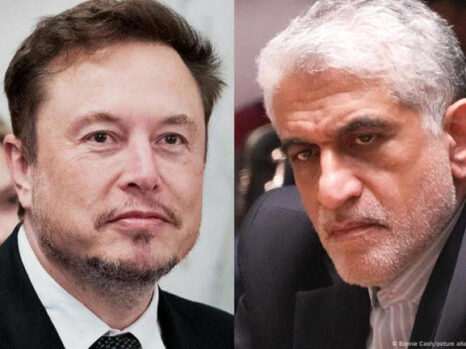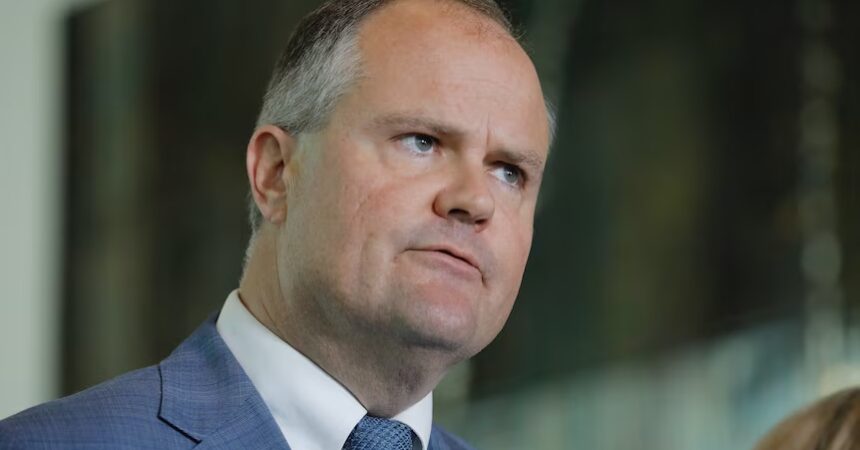Australia will breach the Paris Agreement on climate change regardless of who is in power, the Coalition’s energy spokesman has claimed.
Shadow Energy Minister Ted O’Brien says a promised 43 per cent reduction in emissions by 2030, which Australia committed to under the Paris Agreement, cannot be met — constituting a breach of the agreement.
Australia, like almost every nation in the world, provides a commitment to cut emissions to the United Nations once every five years, and that commitment can only be made more ambitious over time, not weakened.
At the weekend, the Coalition signalled it would walk away from the 2030 target claiming it could not be achieved
Energy Minister Chris Bowen responded if the Coalition did so it would breach the Paris Agreement.
Mr O’Brien suggested if the Coalition failing to reduce emissions by 43 per cent constituted a breach, then Labor was also set to breach the Paris Agreement.
“if Labor is saying that failure to deliver on 43 per cent by 2030 constitutes a breach of the Paris Agreement, they have a lot of questions to answer because that is precisely the pathway they are taking us down,” Mr O’Brien told ABC News Breakfast.
“We are going towards a failure. Labor has gone sideways at best on emissions.”
Prime Minister Anthony Albanese said independent assessments late last year found Australia was projected to fall just short of its 43 per cent target, and the government had made further commitments since then.
“We were on track for 42 per cent last December and since then we’ve had significant new policies announced that will further enhance the opportunity [to cut emissions],” he said.
“I’m very confident not only that we can get there but, importantly, that we must get there.”
Mr Albanese said Opposition Leader Peter Dutton’s plan to ditch the 2030 target was walking away from climate action.
“You can’t shape the future if you’re afraid of it,” he said.
No penalty for breaching Paris Agreement, but not consequence-free
The Paris Agreement is an international treaty on climate change, ratified by every nation except Iran, Libya and Yemen, which requires countries to progressively cut emissions towards an ultimate goal of net zero emissions by 2050.
Part of the agreement is to meet interim targets along the way, including a milestone at 2030 — recognising that the world has a total ‘carbon budget’ it must meet, with emissions having a cumulative effect over time.
Scientists warn without reducing global emissions by 45 per cent by 2030 and net zero by 2050 there is no chance of limiting global warming to 1.5 degrees Celsius.
There is no direct penalty for breaching the Paris Agreement, but environment groups say doing so could expose Australia to difficulties in trade negotiations and could harm international relations in the Pacific.
However there are many signatories, including major emitters like the United States, who may also fail to meet their emissions commitments.
Since announcing they would dump the 43 per cent target, the Coalition has been cagey about what they would do next, whether that would be to leave Australia without a 2030 target or set a weaker one.
Mr O’Brien was repeatedly pressed on that point this morning but offered no detail.
“What I can tell you when it comes to targets is, firstly, unlike Labor, we won’t be plucking a number out of thin air,” Mr O’Brien said.
The Energy Department projects Australia’s emissions are on track to reach 42 per cent below 2005 levels by the decade’s end, with Australia to squeak under its allocated ‘carbon budget’ set under the Paris Agreement.
However the Climate Change Authority, the independent climate watchdog, reported late last year that not only was Australia not on track to meet its 2030 commitment, but emissions had actually risen over the year to June 2023 by four million tonnes.
Mr O’Brien said the government was 21 million tonnes off track last year, taking into account that small rise.
Energy Minister Chris Bowen has been contacted for comment.














